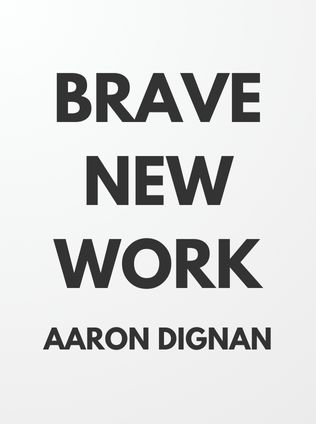
Brave New Work
Are You Ready to Reinvent Your Organization?
By Aaron Dignan
Published 01/2019
About the Author
Aaron Dignan is a forward-thinking entrepreneur, consultant, and author who has dedicated his career to helping organizations evolve in a rapidly changing world. As the founder of The Ready, a consulting firm that specializes in organizational transformation, Dignan has worked with companies across industries to implement new ways of working that emphasize autonomy, flexibility, and decentralized decision-making. His book, "Brave New Work," distills his extensive experience and insights into a comprehensive guide for leaders looking to create more adaptive, human-centered organizations. Dignan’s work challenges the status quo of rigid hierarchies and bureaucratic processes, advocating instead for structures that empower employees and enable organizations to thrive in the face of complexity and uncertainty.
Dignan's approach is grounded in the belief that traditional organizational models are increasingly inadequate in the modern world. He argues that the rapid pace of technological change, the complexity of global markets, and the shifting expectations of workers require a fundamental rethinking of how organizations are structured and managed. Through his work with The Ready and his writing, Dignan has become a leading voice in the movement towards more dynamic, responsive, and resilient organizations. His ideas have influenced a wide range of industries, from technology and finance to healthcare and education, and his book has become a key resource for leaders seeking to navigate the challenges of the 21st century.
Main Idea
"Brave New Work" is a manifesto for a new way of organizing work that is better suited to the complexities and uncertainties of the modern world. Aaron Dignan argues that the traditional hierarchical, bureaucratic structures that dominate most organizations are no longer effective. These legacy systems are slow, rigid, and ill-equipped to handle the rapid changes and increasing complexity of today’s business environment. Instead, Dignan proposes a set of principles and practices that prioritize autonomy, flexibility, and decentralized decision-making, enabling organizations to become more adaptive, innovative, and resilient.
The central thesis of the book is that organizations must abandon their reliance on rigid hierarchies and embrace more fluid, flexible structures. Dignan provides a framework for this transformation, which he terms "people-positive" and "complexity-conscious" systems. These systems are designed to empower employees, encourage collaboration, and allow organizations to respond more effectively to change. By implementing these principles, Dignan argues that organizations can unlock the full potential of their people, foster greater innovation, and build a culture that is resilient in the face of uncertainty.
Table of Contents
- Why Old Organizational Structures Are Failing
- Foundational Principles: Autonomy and Flexibility
- Strategies for Implementing Change
- Set the Stage for Change
- Establish Psychological Safety and Consent Processes
- Distribute Authority Widely
- Create Dynamic Teams
- Practice Looping Continuously
Why Old Organizational Structures Are Failing
Dignan begins by diagnosing the problems with traditional organizational structures, which he refers to as "Legacy Organizations." These are characterized by rigid hierarchies where decisions are made by a few at the top, and the majority of employees have little autonomy or input into how their work is done. Dignan argues that these structures are increasingly ineffective in today’s fast-paced, complex world. They create what he calls "organizational debt," which consists of outdated processes and rules that may have served a purpose in the past but now only hinder progress and innovation.
Organizational debt manifests in various ways, such as unnecessary bureaucratic processes, layers of management that slow down decision-making, and a lack of flexibility in adapting to new challenges. Dignan emphasizes that these inefficiencies are not just a nuisance—they actively undermine the performance and competitiveness of organizations. Research supports this view, showing that a significant portion of employees’ time is wasted on internal bureaucracy rather than productive work. Dignan argues that reducing this organizational debt is crucial for improving efficiency, employee engagement, and overall organizational performance.
One of the most significant issues with traditional structures is that they fail to engage employees. When workers feel that they have little control over their work and are micromanaged by their superiors, they become disengaged and less motivated. This disengagement leads to lower productivity, higher turnover rates, and a general decline in organizational morale. Dignan contends that the key to reversing this trend is to give employees more autonomy and involve them in decision-making processes that affect their work. By doing so, organizations can tap into the intrinsic motivation of their employees, leading to higher levels of engagement and better overall performance.
- Traditional hierarchical structures create "organizational debt" that hinders progress.
- Unnecessary bureaucracy and layers of management slow down decision-making and reduce efficiency.
- Employee disengagement is a major problem in traditional organizations, leading to lower productivity and morale.
Foundational Principles: Autonomy and Flexibility
At the heart of Dignan’s vision for modern organizations are two key principles: autonomy for employees and flexibility in organizational structures. These principles, which he refers to as "people-positivity" and "complexity-consciousness," are designed to create an environment where employees are empowered to take ownership of their work and where the organization can adapt quickly to changing circumstances.
Sign up for FREE and get access to 1,400+ books summaries.
You May Also Like
The Subtle Art of Not Giving a F*ck
A Counterintuitive Approach to Living a Good Life
By Mark MansonRich Dad Poor Dad
What the Rich Teach Their Kids About Money - That the Poor and Middle Class Do Not!
By Robert T. KiyosakiHow To Win Friends and Influence People
The All-Time Classic Manual Of People Skills
By Dale CarnegieQuiet: The Power of Introverts
The Power of Introverts in a World That Can't Stop Talking
By Susan Cain



















